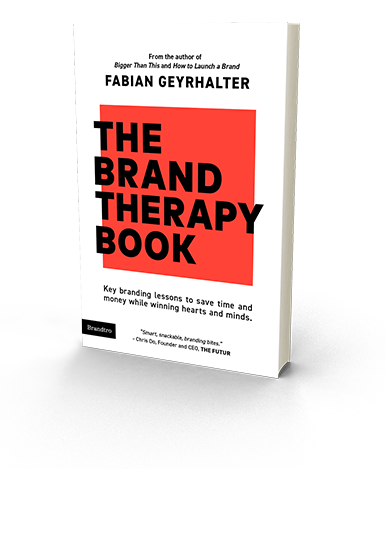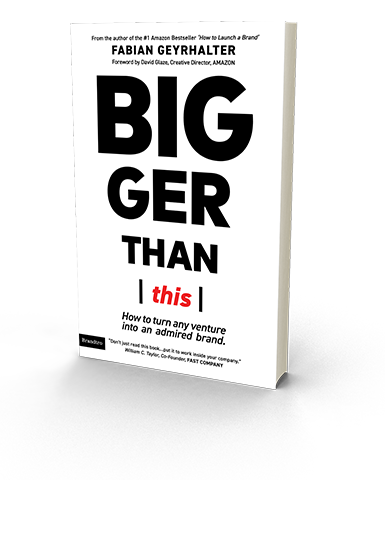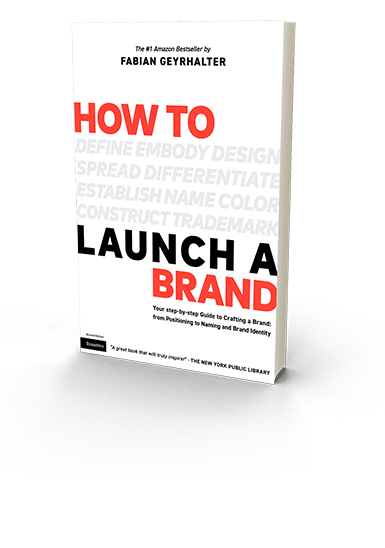Blog Archives
Ep005 – Maxwell Cohen, Founder, Peel Away Labs
Fabian Geyrhalter speaks with Maxwell Cohen, who founded the innovative startup that developed Peelaways, the bedding industry’s first multilayered, disposable, waterproof fitted sheet designed for the home, industrial and healthcare markets.
CATEGORIES:
Ep004 – Chris Do, Founder, The Futur
Fabian Geyrhalter talks with Chris Do, the Emmy award-winning designer, director, strategist, lecturer, consultant, and serial entrepreneur who is out to disrupt the world of education through his latest venture, the online content and education platform, The Futur.
CATEGORIES:
Ep003 – Matt Jamie, Founder, Bourbon Barrel Foods
Fabian Geyrhalter speaks with Matt Jamie, a self-taught chef from Louisville, Kentucky. Matt is the founder, president, and CEO of Bourbon Barrel Foods, and the author of the EAT YOUR BOURBON cookbook. Bourbon Barrel Foods is the original microbrewer of soy sauce in America and a manufacturer of gourmet food products that represent the rich history and heritage of Kentucky’s Bourbon Country.
CATEGORIES:
Ep001 – Raaja Nemani, Co-Founder, Rogue Brands
Fabian Geyrhalter talks to Raaja Nemani on this inaugural episode of Hitting The Mark.
Raaja is the Co-Founder of Rogue Trading Company (the parent company to Rogue Advising, MarketerHire, and Rogue Brands).
Previously, he was the Co-Founder and CEO of Bucketfeet (a D2C, artist-designed footwear brand). Bucketfeet was acquired in 2017 by Threadless.
We dive into his factory-direct platform and how brand strategy has affected his recent company launches as well as his time launching and scaling the successful footwear marketplace Bucketfeet.
CATEGORIES:
Story – When the background story is bigger than the product
Focusing on trait #1 (story) of Geyrhalter’s acclaimed book “Bigger Than This – How to turn any venture into an admired brand.
CATEGORIES:
Delight – When the small delight is bigger than the product
Focusing on trait #5 (delight) of Geyrhalter’s acclaimed book “Bigger Than This.”
CATEGORIES:
Transparency – When trust is bigger than the product
Focusing on trait #6 (transparency) of Geyrhalter’s acclaimed book “Bigger Than This.”
CATEGORIES:
On the Belgian Podcast Let’s Talk Branding with Stef Hamerlinck
We discuss brand strategy for startups, my consultancy’s unique process of crafting brands and when not to invest in branding.
CATEGORIES:
How To Turn Any Business Into A Brand
On The Futur channel, Fabian discusses how to go beyond the way something looks, so you can craft a brand your customers will love
CATEGORIES:
Five Ways To Transform Into An Authentic Brand That People Will Love
The full article of below’s excerpt was first published on Forbes on 05/16/18.
How can a brand transform into being authentic when authenticity is the very core of any brand?
Last year, I wrote a book in which I studied commodity brands that people go crazy for in today’s age of innovation and disruption. It fascinated me to think that companies offering commodities — products that people don’t necessarily need more of in the marketplace, and that see no innovation in functionality or design — were flourishing. All of these companies had only two things in common that created their success: fantastic brand thinking and a truly authentic story to tell.
There’s a lot to learn from these brands, even for an established brand that may have lost its authenticity along the way. Here are five traits I saw in these companies and how they can be reinfused into any brand that wants to connect more deeply with its audience:
1. Story
Telling a brand’s story is key to branding and a fundamental element of any marketer’s playbook. Charles Revson, founder of Revlon, famously said, “In the factory we make cosmetics; in the store we sell hope.” Stories can change brand perception more than anything else, but they have to be authentic in order to resonate.
Rewrite a brand’s story by going back to its roots. You have to feel the passion that initially formed the brand, then work your story from there. People love visionaries, problem-solvers, DIYers. They love passion and, in return, will become passionate about your brand.
2. Cause
Lately, we have been “cause-washed” by thousands of startups jumping on the “buy one, give one” bandwagon started by the TOMS and Warby Parkers of the world. Yet there is a reason for their success. According to a survey, almost two-thirds of respondents said they actively seek out brands that support certain causes, and they’d be more likely to purchase from a brand that supports a cause they agree with.
Instead of writing a big year-end donation check or blindly giving a product away for every product purchased, ensure the cause you support is fully integrated into your brand’s messaging and can only be seen as truthful. Base it on a logical proposition that creates an immediate emotional connection with your audience. Plan for it to be expandable as your service or product offering diversifies.
3. Delight
Researching commodity brand sensations, I stumbled upon a slew where the small delights they offered were bigger than the actual product. A great example is pet supply startup Chewy, which takes delighting its customers’ love of their pets to heart. The brand sends out handwritten cards, including the customer’s pet’s name and provides a 24-hour hotline for customers to ask pet-food-related questions. How impactful can the brand trait of simple customer delight exactly be? Well, Chewy was acquired by PetSmart.com for $3.35 billion in 2017, which was a record for an e-commerce company.
The core idea of consistently providing small but thoughtful delights is often the only thing setting brands apart.
If you’re operating in a rather mundane segment, think about which part of your audience is not having fun, then catch them when and where they least expect it and shake them up through delightful surprises. Start with email and slowly work through your entire communication chain. One interaction at a time will make your brand more loved.
4. Transparency
You will likely recall when Avis, which held the No. 2 spot behind market leader Hertz, famously launched its 1963 brand campaign with the tagline, “When you’re only No. 2, you try harder. Or else.” That was sheer brand transparency gold.
Today’s startups enter markets and verticals that have been known for not being truthful. If your brand falls into a category that aches for transparency, comply and tell all. Customers will instantaneously trust your brand as a whole and its products over your competitors.
5. Solidarity
Aligning a brand empathetically with someone else’s dream is a move I saw many startups discover. Often going after an initial niche audience, their entire messaging became aligned around their tribes’ point of view. They exclude everyone else and thrive.
Planet Fitness is a poster child for leading with solidarity. “We don’t judge” is the motto, and “judgment-free zone” is the verbal brand glue that holds its 1,300-plus franchise locations together. Occasional free donuts at the fitness center entrance and tweets about sweets connect more than 6 million members that would otherwise not have easily found their tribe in a traditional gym.
Perhaps it’s time for your brand to wholeheartedly support your tribe’s feelings and actions and, in turn, become one of them. Forming, not forcing, a friendship with your audience is the best way to create long-term brand love.




